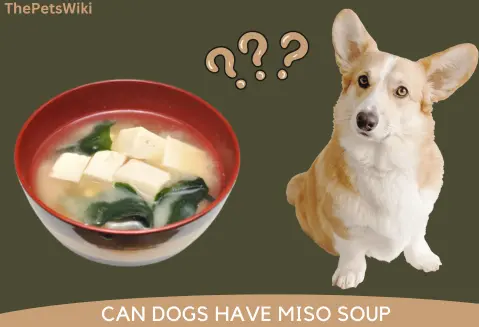Dogs are a man’s best friend, and it’s only natural for dog owners to want to share every bit of their lives, including their meals, with their furry companions. If you’re a fan of Japanese cuisine, you might have wondered at some point: “Can dogs have miso soup?” The answer isn’t as straightforward as a simple yes or no. Dive in with us to understand the pros and cons of offering miso soup to your beloved pet.
Suggested Reding: Can Dogs Eat Gushers? The Tasty Truth You Need to Know
Understanding Miso Soup
Before deciding it’s safe for dogs, it’s crucial to understand what miso soup is made of. Miso soup is a traditional Japanese dish primarily consisting of miso paste (fermented soybeans) and dashi (a broth made from fish and kelp).
Miso Soup Ingredients
- Fermented soybeans
- Miso paste
- Seaweed
- Tofu
- Vegetables (onions, carrots, leeks, mushrooms)
- Soy sauce
- Rice
- Garlic
- Various types of meat (Fish, Beef, Mutton, Chicken)
Threatening Ingredients in Miso Soup
1. Miso Paste: At its core, miso is fermented soybeans. Fermented foods can sometimes offer probiotic benefits. However, the high sodium content in miso paste might pose a threat to dogs, especially in large amounts.
2. Dashi: Dashi contains fish extracts and kelp. While fish can benefit dogs due to its Omega-3 fatty acids, the concern lies with the seasonings and high salt content typically present in dashi.
3. Add-ins: Tofu, when given in moderation, can be a harmless treat for most dogs. However, ingredients like onions and certain types of seaweed could be harmful. Onions, in particular, are toxic to dogs and can lead to serious health problems.
Potential Risks
- Salt Overload: Dogs need only a small amount of salt in their diet. Excessive salt intake can lead to increased thirst and urination, and in severe cases, it might result in sodium ion poisoning, which is characterized by symptoms like vomiting, diarrhoea, seizures, and even death.
- Digestive Issues: Given that miso soup contains ingredients unfamiliar to a dog’s regular diet, it might result in digestive discomfort or even diarrhoea.
- Onion Toxicity: Even trace amounts of onions can harm dogs, causing oxidative damage to their red blood cells and leading to anaemia. If your miso soup contains onions or is prepared in a broth containing them, it’s best to avoid giving it to your dog.
Safety Precautions
If you decide to offer a taste of miso soup to your dog:
- Check the Ingredients: Ensure there are no harmful additives, especially onions.
- Limit Quantity: Due to the high sodium content, it’s best to offer only a small amount.
- Observe After Feeding: Watch out for any signs of discomfort, excessive thirst, or digestive issues.
Bottom Line
While sharing a meal with our dogs can be a heartwarming experience, it’s essential to prioritize their health. Miso soup, due to its unique combination of ingredients, might not be the ideal treat for dogs. If you wish to introduce any new food into your dog’s diet, always do so with caution, in moderation, and it’s advisable to consult your vet, especially if you’re unsure about the ingredients. Remember, it’s always better to be safe than sorry when it comes to the health of our furry friends.


